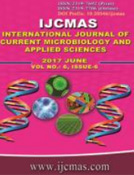


 National Academy of Agricultural Sciences (NAAS)
National Academy of Agricultural Sciences (NAAS)

|
PRINT ISSN : 2319-7692
Online ISSN : 2319-7706 Issues : 12 per year Publisher : Excellent Publishers Email : editorijcmas@gmail.com / submit@ijcmas.com Editor-in-chief: Dr.M.Prakash Index Copernicus ICV 2018: 95.39 NAAS RATING 2020: 5.38 |
Soil salinity is considered as a one of the major abiotic stress posing great challenges to the growth and production of crops around the world. Salinity affects various physiological processes related to plant growth and development. Salinity induced a drastic decline in chlorophyll content, chlorophyll stability index and photosynthesis activity in the plants. Phytohormones are chemical messengers produced in one part of plant and translocated to the other parts, where they play critical roles in regulation of physiological process and plant responses to abiotic stresses including salinity stress. In this study, the pot culture experiment was carried out with two contrasting rice varieties differing in salinity tolerance viz., pokkali and CO51. These two rice varieties were foliar applied with different plant growth regulators associated with salinity tolerance at varied concentrations under 160 mM NaCl salinity conditions. We attempted to investigate the influence of plant growth regulators for mitigating the salinity stress in contrasting rice varieties. Among the four hormones studied, brassinolide @ 1ppm increased the photosynthetic rate and chlorophyll fluorescence whereas gibberellic acid @ 50 ppm improved the chlorophyll content compared to other hormones besides enhanced transpiration through 20 ppm kinetin rate under salinity stress. This study indicated that plant growth regulators could be effectively used for improving physiological traits, thereby increasing the yield in rice under salinity stress. Further, the response in terms of improvement in physiological traits was similar in both tolerant and sensitive varieties.
 |
 |
 |
 |
 |